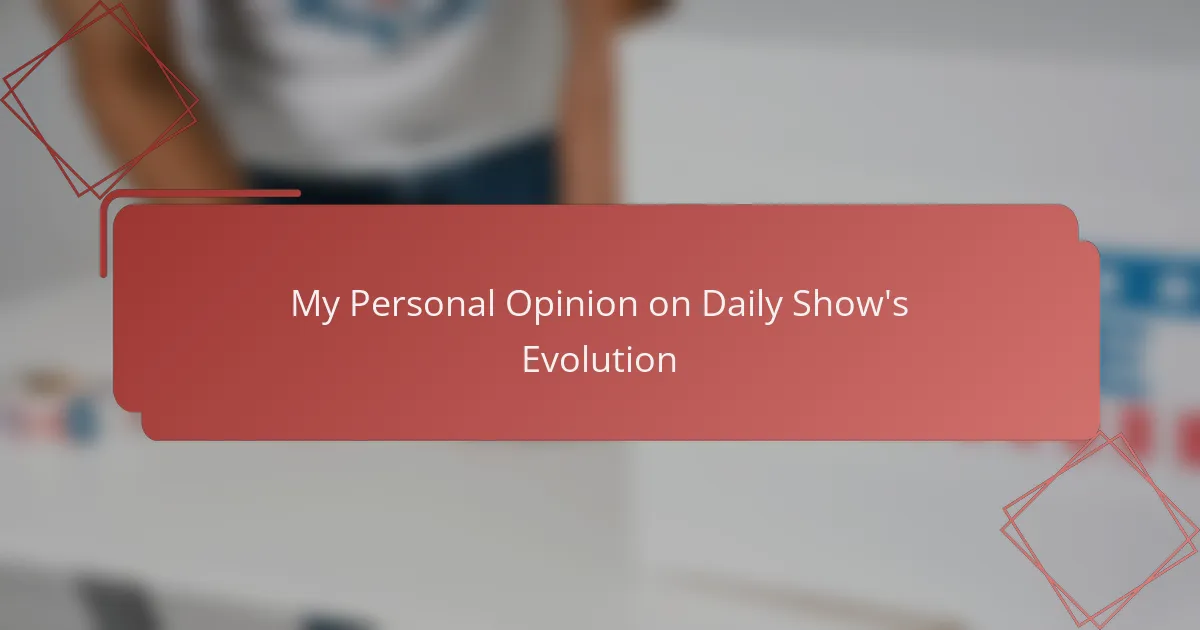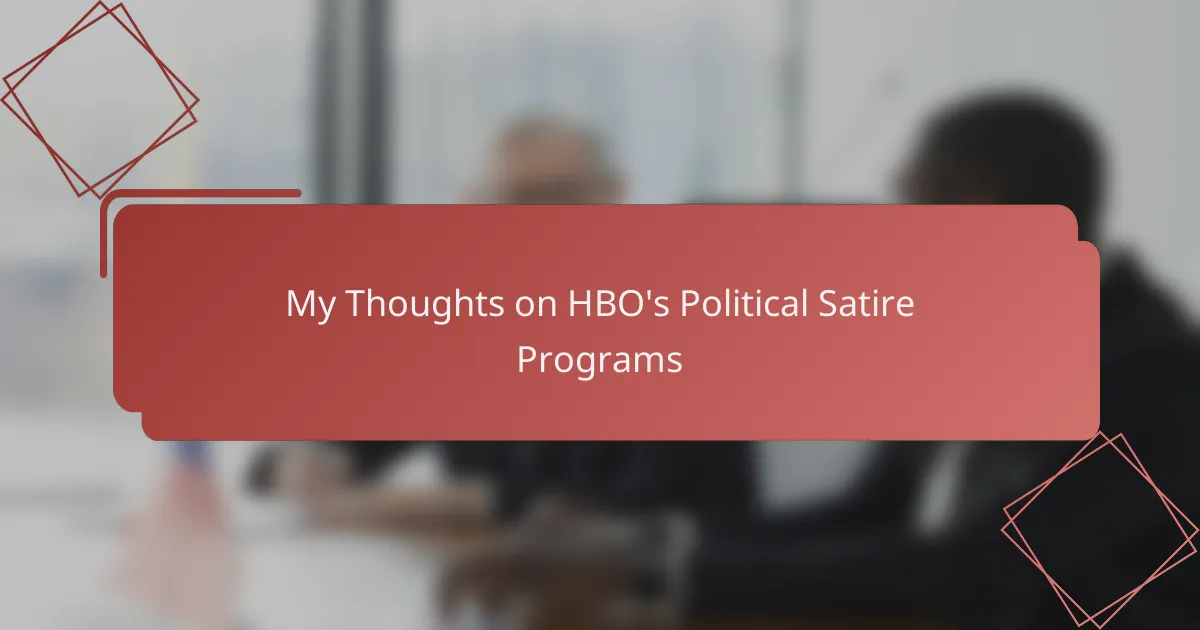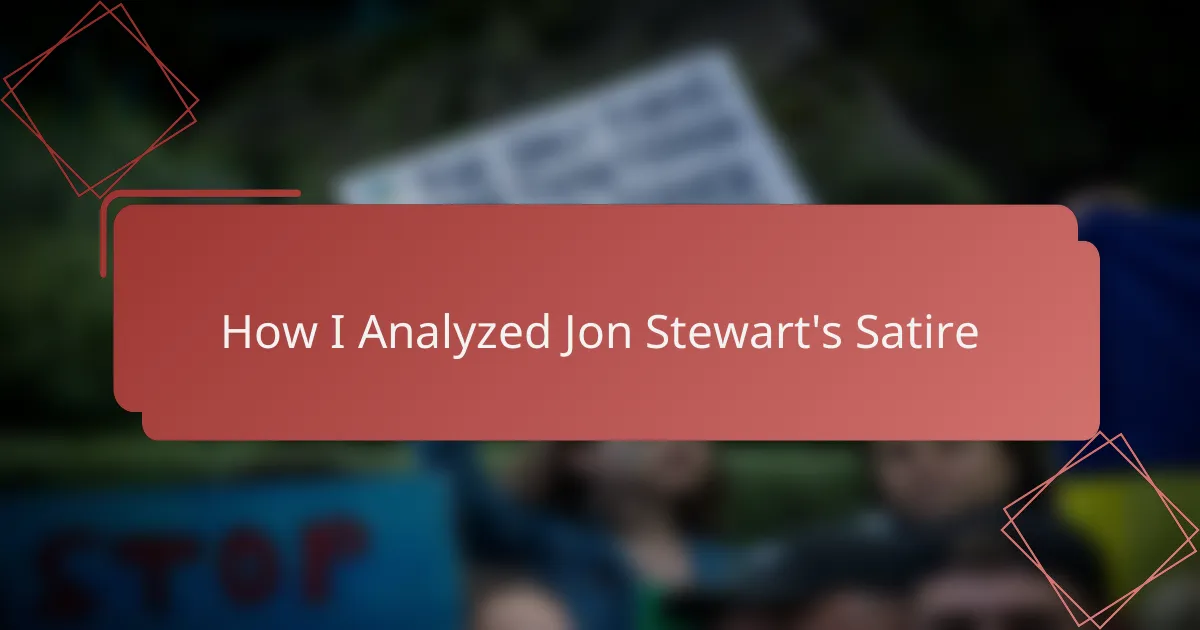Key takeaways
- Political satire in media informs and entertains, encouraging viewers to question authority and societal norms.
- The Daily Show evolved significantly from a simple parody to a platform for insightful political critique, especially under hosts Jon Stewart and Trevor Noah.
- Episodes increasingly blend humor with nuanced political commentary, addressing complex themes like government inefficiency, corruption, and social justice.
- Different hosting styles shape the show’s approach to satire, ranging from humor-first to analytical, reflecting diverse perspectives in political discourse.
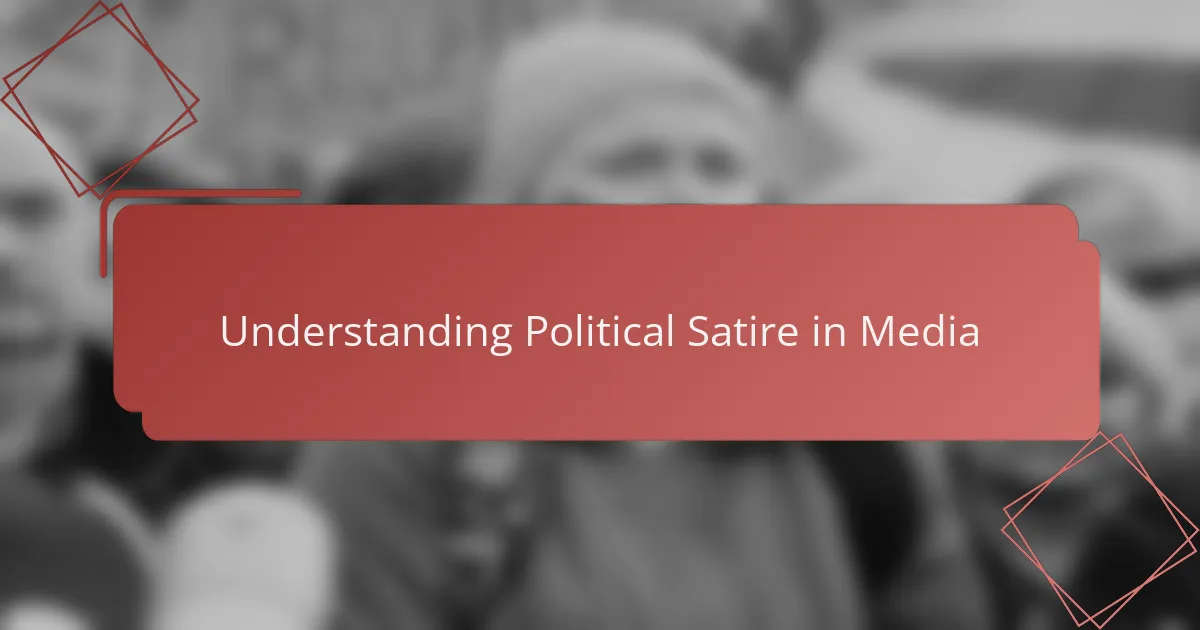
Understanding Political Satire in Media
Understanding political satire in media means recognizing its power to shape public perception while entertaining audiences. From my experience, the sharp wit and clever critiques found in daily shows help viewers digest complex political realities with humor and insight. It’s fascinating how satire not only informs but also challenges us to question authority and societal norms.
| Traditional Political Commentary | Political Satire in Daily Shows |
|---|---|
| Serious tone focusing on facts and analysis | Humorous tone blending facts with irony and exaggeration |
| Often formal and structured presentation | Informal, conversational style engaging broader audiences |
| Primarily aimed at informing | Combines informing with entertainment and critique |
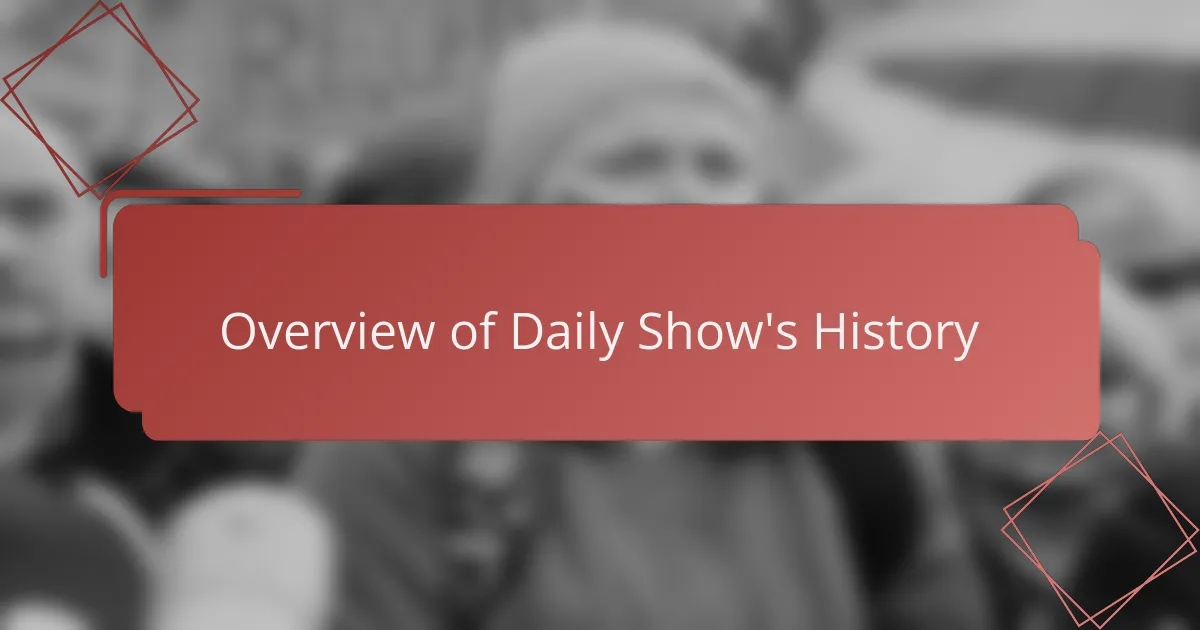
Overview of Daily Show’s History
The Daily Show has undergone a fascinating transformation since its inception in 1996, evolving from a straightforward satire of late-night talk shows to a sharp, critical voice in political commentary. I remember watching Jon Stewart take the helm in 1999, and it immediately felt like the show had found its true rhythm—clever, insightful, and unapologetically bold.
Looking back, the show’s history is marked by significant milestones that shaped its unique style and influence:
- Created by Lizz Winstead and Madeleine Smithberg, initially hosted by Craig Kilborn.
- Jon Stewart became the host in 1999, redefining the show’s political satire approach.
- Under Stewart, The Daily Show embraced more pointed critiques of government and media.
- Successor Trevor Noah brought a more global perspective, expanding the show’s reach.
- The show became a training ground for future satirists and comedians who impact political discourse today.
This evolution really resonates with me because it reflects how humor can adapt while maintaining a powerful voice against political absurdities.
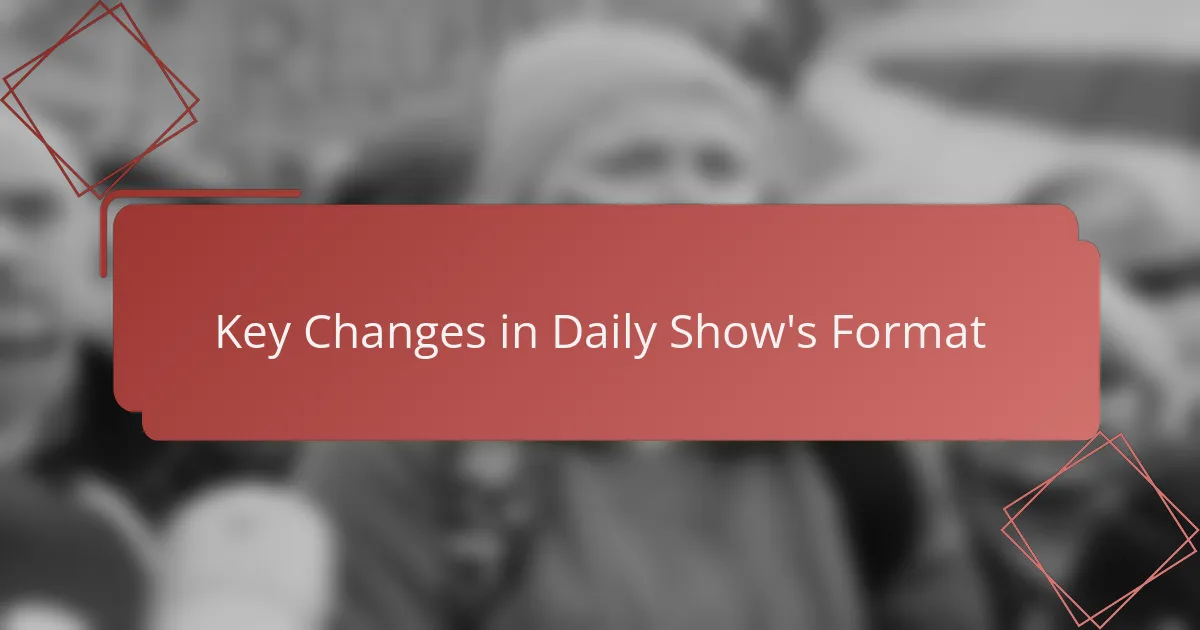
Key Changes in Daily Show’s Format
One key change I noticed in The Daily Show’s format was its shift from a simple parody of late-night talk shows to a more focused political critique under Jon Stewart. It wasn’t just about making fun anymore; it became a platform that challenged political narratives with a sharp and fearless tone that I found both refreshing and necessary.
Another transformation that caught my attention was how Trevor Noah introduced a broader, more international perspective. His background allowed the show to explore global issues alongside American politics, making the satire feel more inclusive and relevant in an increasingly interconnected world. Have you ever felt that same sense of expanded awareness when tuning in?
Finally, the inclusion of recurring segments and correspondents transformed the format into something more dynamic and character-driven. These voices added layers of satire through impersonations and mock interviews, which made complex political topics more approachable and, honestly, a lot more fun to watch. From my experience, this mix of humor and information turned the show into a unique space where entertainment and critique coexist seamlessly.
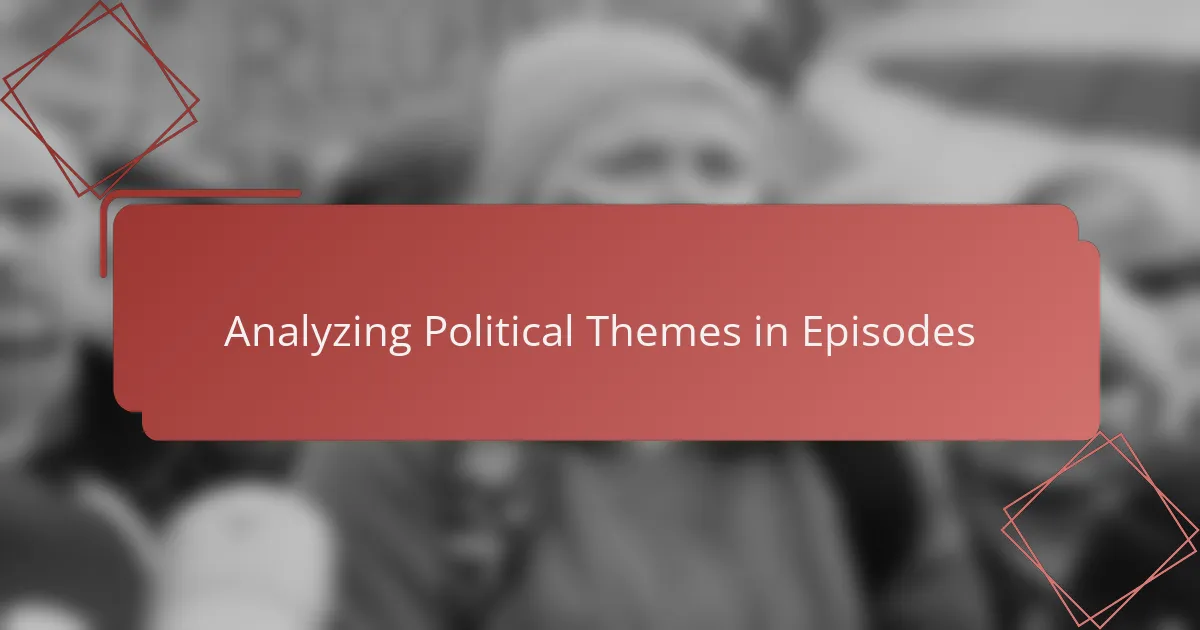
Analyzing Political Themes in Episodes
Political themes have always been the backbone of daily shows, but what fascinates me is how the approach to these themes has matured over time. Early episodes often felt like surface-level jokes, but as the shows evolved, they started weaving complex political narratives that demand viewers to think critically. I remember watching a recent episode that tackled healthcare reform—its blend of humor and hard truths hit me harder than I expected, making me reflect on the real-world implications beyond the punchlines.
What’s striking is how the shows now balance satire with nuanced commentary, offering more than just laughs. They often highlight the absurdities in political systems while exposing deeper issues such as corruption and voter disenfranchisement. From my perspective, this shift has made the content more impactful and emotionally resonant. Here are some recurring political themes I’ve noticed evolving in daily show episodes:
- Government inefficiency and bureaucracy
- Campaign finance and political corruption
- Media manipulation and misinformation
- Polarization and partisan conflicts
- Social justice and civil rights struggles
- Voter suppression and electoral integrity
- Foreign policy critiques and international relations
Reflecting on these points, I realize that daily shows now serve as both entertainers and educators, blending sarcasm with sharp political insight in ways that shape public discourse.
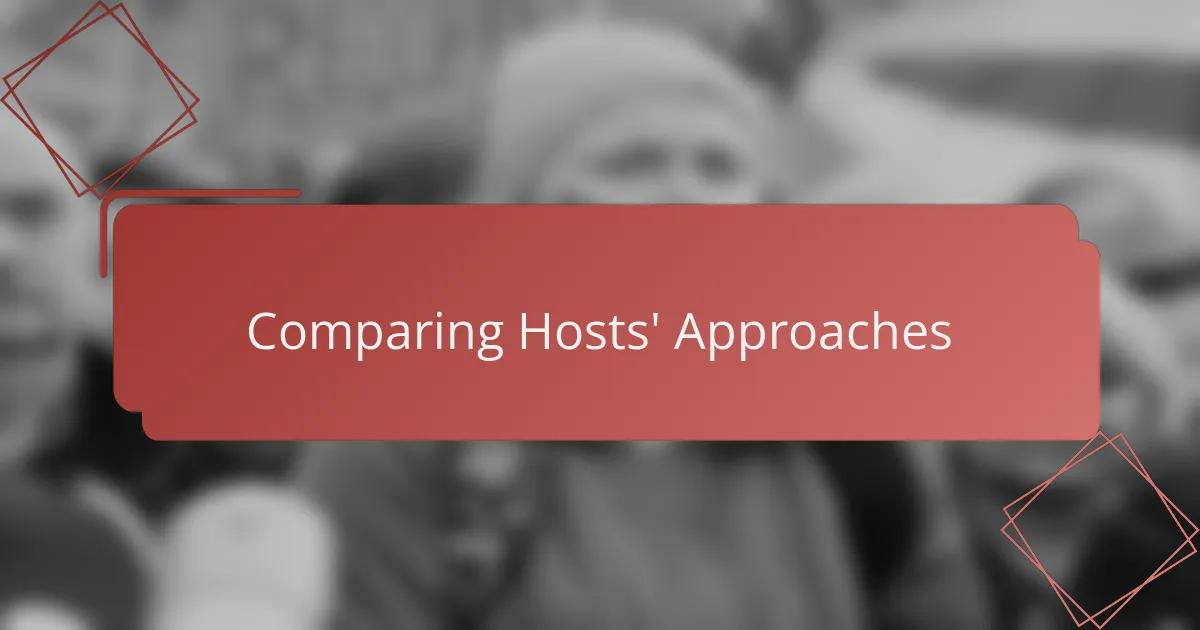
Comparing Hosts’ Approaches
When comparing hosts’ approaches on daily shows, I’ve noticed how each one brings a distinct flavor to political satire. Some lean heavily into humor, using clever jokes to ease the sting of harsh truths. Others adopt a more serious tone, combining satire with sharp analysis that makes me think, sometimes challenging my own views.
From my experience, the differences often come down to style and intent. One host might poke fun at politicians with rapid-fire quips, making me laugh out loud but also helping me remember key points. Another might slow down, using satire as a tool to dissect complex issues, which feels like a mini-lesson wrapped in comedy. Here’s a brief look at how I see these approaches:
- Humor-First Hosts: Use quick wit and punchlines to engage and entertain.
- Analytical Satirists: Blend comedy with in-depth political commentary.
- Interview-Focused Hosts: Use satire to highlight contradictions in guests’ statements.
- Character or Sketch-Based: Employ impersonations and sketches for exaggerated critique.
- Interactive and Audience-Driven: Incorporate viewer feedback and social media for real-time satire.
These varied methods reflect how each host’s background and personality shape their satire, making daily shows a rich and diverse space for political commentary.
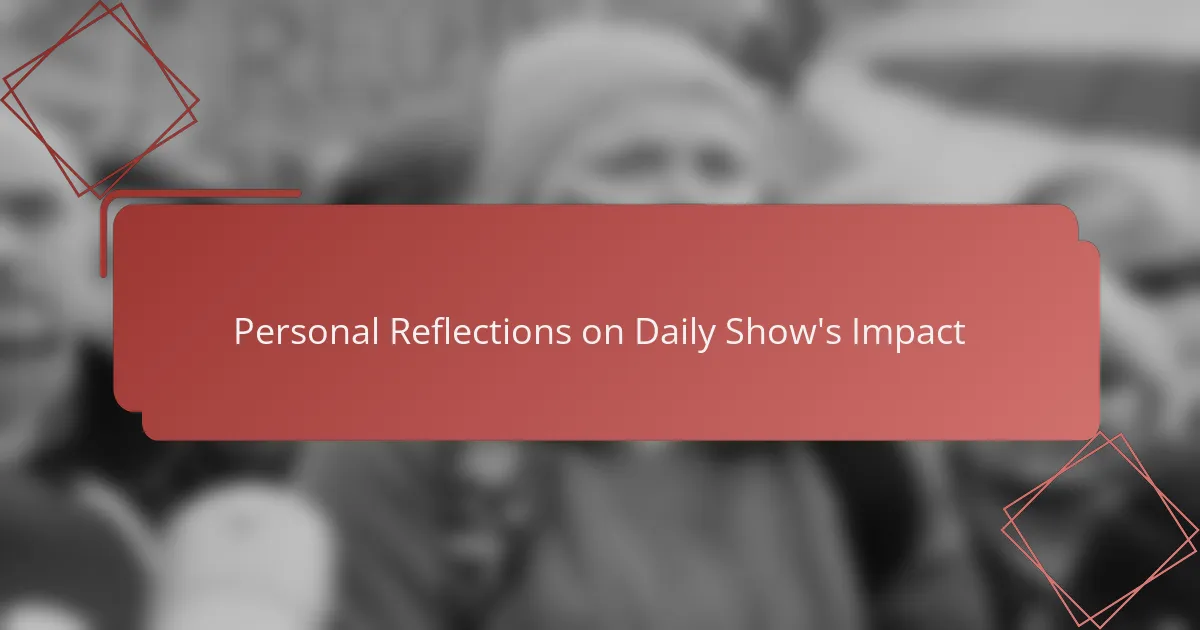
Personal Reflections on Daily Show’s Impact
Personal Reflections on Daily Show’s Impact
The Daily Show’s blend of humor and incisive political critique has always resonated with me. I remember watching it during some tense election cycles, feeling both informed and entertained in a way that traditional news never quite achieved. This balance made complex political issues more accessible and sparked conversations among my friends who otherwise avoided heavy politics.
| Aspect | Effect on Audience |
|---|---|
| Satirical Commentary | Helps demystify politics, making it relatable and engaging |
| Humor as a Tool | Reduces political anxiety and encourages critical thinking through laughter |
| Emotional Engagement | Creates a personal connection, motivating viewers to stay informed and involved |
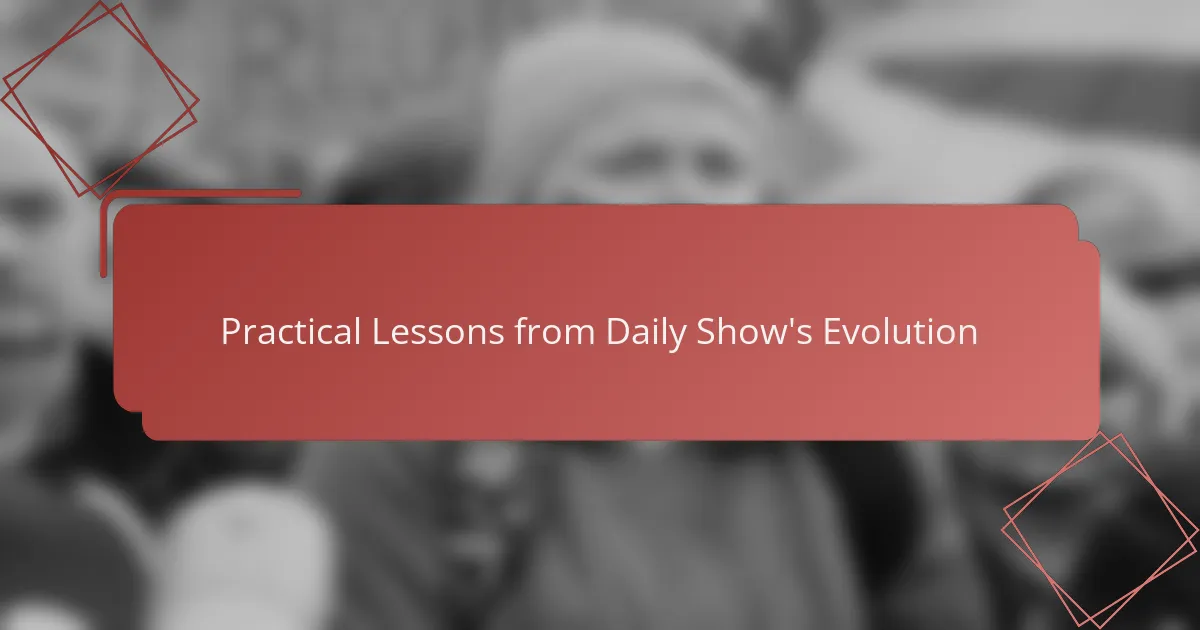
Practical Lessons from Daily Show’s Evolution
Practical Lessons from Daily Show’s Evolution
Watching The Daily Show evolve over the years has taught me the power of adapting satire to the cultural and political climate. Jon Stewart’s era showed me how humor can enlighten while holding power accountable, but Trevor Noah’s approach added a global perspective that resonates with a more diverse audience. This evolution reminded me that staying relevant means embracing change and broadening your viewpoint without losing your core message.
| Aspect | Jon Stewart Era | Trevor Noah Era |
|---|---|---|
| Satirical Style | Sharp, direct political critique | Broader, global social commentary |
| Audience Engagement | Primarily U.S.-focused, politically savvy viewers | Diverse, international viewers with varied political backgrounds |
| Impact | Heightened political awareness and skepticism | Encourages cultural understanding and global discussions |
